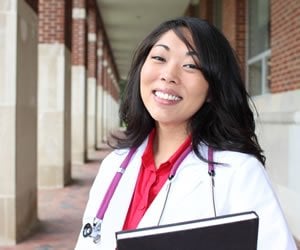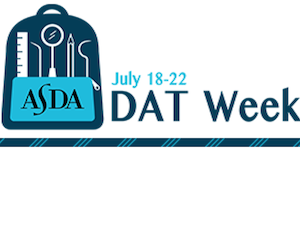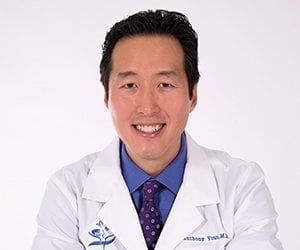Brian Baxter, PhD, is a current postdoctoral scholar with the DeRisi Group at University of California, San Francisco (2011-present), where he is working to optically encode polymer microbeads containing rare-earth nanophosphors and produce them using an automated microfluidic device. Baxter received his bachelor’s degree in chemistry at University of California Davis (summa cum laude, 1994). He went on to receive his PhD in organic chemistry from University of California Berkeley (2000). During his studies at UC Davis, Baxter was an undergraduate research assistant on a project involving the synthesis of novel porphyrins for photodynamic therapy applications. While at Berkeley, Baxter worked on a project sequencing the Anabaena Genome. His graduate research and thesis involved a modular approach to chiral liquid-crystalline diacrylates using a natural product as the chiral unit.
Paving the Road to Medical School
The path to becoming a doctor can feel daunting. For those of us that don’t come from a medical family, it can be challenging to navigate what all you need to do to be a competitive candidate. As a third year psychiatry resident looking back on my pre-med days, I realize just how lost-in-the-woods I felt at times trying to figure out how to get where I wanted to go. Here are half a dozen steps you can take to help pave the way to medical school.
Chronicles of a Med Student: Gearing Up For Round Two!
Welcome back! I’m so excited to start my second year (and write about it, of course), but first things first: my amazing summer experience! I went to South America for a few weeks to work at a women’s health clinic. It was an incredible experience. I don’t say that only because I’ve lived to tell the tale, but also because I got to experience a totally new culture and visit one of the seven wonders of the world. The fact that I got to work in a healthcare setting there expanded my communication skills as well as my patience. It can be challenging to work in conditions that are very different from those we see in clinics in the US: sometimes things as basic as lighting aren’t there and you just have to deal with it. This “roll with it” attitude is something I’ve struggled with in the past. Because we’re taught to do things in a very specific manner here in the States, it can be very hard to have to adjust on the spot. Dealing with folding tables for hospital beds and performing physical exams in dimly lit rooms has definitely taught me to work with what’s in front of me. I hope that lesson will last the rest of my career.
Medical School Interview Do’s and Don’ts
One of the most important phases of the application process is your interview. It’s your chance to demonstrate your communication and interpersonal skills, judgment, maturity, and the qualities that are important for a future physician. It’s also your opportunity to see if the school’s learning environment and culture is a good fit for you. It may seem early to start thinking about interviewing, but some medical schools start as early as July, while others interview throughout the fall and spring until their class is filled.
To help make your interview day a success, here are a few do’s and don’ts to keep in mind as you prepare.
What Students Should Know About Post-Bac Programs for Career Changers
This two-part series will discuss two types of post-baccalaureate pre-medical programs. This piece will address programs for career-changers, while next month’s post will cover programs designed to enhance one’s GPA and range of science coursework.
With the number of nontraditional medical school applicants on the rise, many future doctors graduate from college without most or all of the medical school prerequisites under their belt. They embark on a career outside of medicine, and they eventually decide that becoming a physician is the right decision for them. If you are one such prospective medical school applicant, you may be considering a post-baccalaureate pre-medical program, or “post-bac,” in order to complete your prerequisites and to streamline the admissions process. Understanding the details of such programs can be challenging, so why not begin here with these commonly asked questions—and answers—about post-bac programs for career-changers?
Q&A with Physician-Author with Michael Collins, MD
Tell me about yourself – who you are, what you do, where you practice. I … Read more
How To Start A “Medwives” Support Group
By Amy Rakowczyk, SDN Staff Writer
When my husband and I arrived in our new city of Columbus, Ohio for him to begin his medical training, we didn’t know what to expect, but we knew we wanted one thing for sure: to find other people in our same situation and develop some friendships.
My husband is prior military, so we had grown accustomed to joining “Family Support Groups” at each new military station. It was like a ready-made family, already created for you, all you had to do was show up.
Poker Face: Interpersonal Comparisons in Medical School
Poker, one may reasonably argue, is a game of sheer luck; he (or she) who happens upon the most desirable combination of cards will likely win the round of bets. However, as seasoned players know, the art of poker lies in its psychology. The ability of the player to keep an emotionless persona not just when dealt an appealing hand but especially when dealt a bad one—the poker face—is how competitors can trick each other to win in high stakes situations regardless of their cards.
I find at times medical school to be like a big poker game, with its players the medical students. The stakes are plentiful: a “bet” of a couple hundred thousand dollars that a medical degree will be obtained, a desired specialty (though I am in awe how some of us have already chosen or eliminated fields within months of donning the white coat), a coveted residency program, a preferred lifestyle, and more. With our futures on the line, it is thus natural that we all play our cards to the best of our abilities.
Physician Burnout: What It Is and Its Impact on Future Doctors
Physician burnout is a widely discussed topic among practicing physicians and public health researchers. Many studies have been done showing the implications of burnout on patient satisfaction, career satisfaction, and care outcomes. A few studies even try to measure the dollar cost of burnout to society. However, very few articles appear to address the impact of physician burnout on one very important demographic in medicine: future physicians. Future physicians, such as residents and medical students, are molded by the doctors who come before them. The prevalence of physician burnout is likely to affect the outlook future physicians have regarding their own careers and the possibility of them experiencing their own burnout as well.
Background
Physician burnout in the United States is becoming more common. According to one recent study, roughly 45% of physicians reported feeling signs of burnout, an increase from 39% in a study conducted in 2013. Put another way, nearly 1 out of every 2 physicians has experienced burnout or will in the future.
Why Black Lives Matter Ought to Matter to Medical Students: A Familiar Message Revisited
Reposted from here with permission. “Of all the forms of inequality, injustice in health care … Read more
Beginning Clinical Rotations–An Exercise in Humility
Central to the skillset of every physician is the differential diagnosis; this is the process by which new patients are evaluated to establish the most likely diagnosis. Similarly, the first clinical year of medical school is like a differential for each student, except instead of a medical diagnosis, students are seeking to determine which specialty they will choose. This column explores this differential: experiences from each rotation by a current third year student.
As I write this article, I am thinking about how to compress all that I’ve seen and experienced the last several weeks into a few paragraphs. I’m not sure I’ll be able to do it justice, and if I wrote out all my thoughts it would probably exceed the page limits and the reader’s concentration. So I’m going to focus on a few aspects of this first month of being a third year medical student, and I suspect several themes will reappear and be expanded in future posts.
Column Intro: The Third Year Differential
Central to the skillset of every physician is the differential diagnosis. This is a list of possible diagnoses that helps guide clinical decision-making. By asking specific questions, performing a focused physical exam, and ordering lab tests, all through the lens of the differential, physicians are able to rule in or rule out each item on the list. The differential is not fixed, however; it is a fluid list that can be rearranged or completely changed at any time given new information. This information often comes in the form of an extra piece of history from the patient, a new finding from an imaging study, or frequently, from several lab tests coming back negative.
QBanks Before Step 1: Bomb the Questions, Ace the Test
Here’s a scenario I am asked about a lot: It’s a month before Step 1 and a student is doing lousy on UWorld questions. Or sometimes a student tells me they just took a NBME practice test and dropped from their previous score. Step 1 is getting closer and panic sets in. What should the student do? Bump their test date out a few weeks? Find a new resource? Maybe just quit medicine all together?
This scenario happens to everyone to some degree as Step 1 nears. And although the panic reaction is understandable, poor performance on practice questions before Step 1 is actually a very good thing in many cases. There are three important reasons not to worry too much about wrong answers to practice questions, which I will explain in this post.
Top 3 Myths about MCAT Scores Busted
As with any high stakes exam, it’s not surprising that there are a number of rumors circulating around the MCAT exam. So we are busting three of the top myths about the MCAT scores and score scale.
Myth #1: The MCAT exam is graded on a curve.
There is no curve associated with the MCAT exam. Instead, the MCAT exam is scaled and equated so that scores have the same meaning, no matter when you test. What does that mean, you ask? There are many different test forms that are produced for a testing year, any of which you could see on your exam day. The forms of the exam are designed to measure the same basic concepts and skills, but each form contains different sets of questions. While care is taken to make sure that each form is about equivalent in difficulty, one form may be slightly more or less difficult than another. We adjust for these differences in the difficulty of test questions when we convert the number of questions you answer correctly to the MCAT score scale. This ensures that scores have the same meaning across test administrations and testing years.
The Most Important Lessons I Learned While Applying to Medical School
Applying to medical school is a humbling experience, even if you have a successful application cycle. No matter how great your pre-medical advisor is or how many articles you have read about the process, you are still bound to have a few missteps that will leave you doubting yourself as a potential MD or DO candidate. It has been nearly a year since I submitted my primary AMCAS application, and as I reflect on the application cycle, several moments stand out to me as essential lessons to learn before you begin your own application process:
Three Things to Consider if You Want to Quit Medicine
It was during my third-year pediatrics rotation that the doubts started creeping in. I really … Read more
My Top 5 DAT Study Tips
This article originally ran on ASDA’s blog, Mouthing Off, on Feb. 3, 2016. ASDA encourages all predentals to join us in celebrating DAT Week 2016 and becoming a member of the association.
Remember studying for the SATs? Or maybe you don’t because you didn’t need to. Now we’re older and smarter, and have made the decision to pursue dentistry as a career. With that though comes its own set of preparation, most notably the Dental Admission Test (DAT). This past summer, I prepped and took the DAT. This exam is certainly no SAT, and anyone who’s set on taking it has to prepare. In my preparations for the DAT, I acquired some helpful strategies and tips that I have compiled into five simple steps to help you succeed on the DAT.
Q&A with Physician-Author Dr. Anthony Youn
Dr. Anthony Youn is a board certified plastic surgeon, author, and television personality. He graduated from Michigan State University College of Human Medicine, completed his general surgery and plastic surgery residencies at Grand Rapids, and finished up with an aesthetic plastic surgery fellowship in Los Angeles. He now works at his private practice, Youn Plastic Surgery, PLLC, in Troy, Michigan.
Post-Bacc Program Guide
Post-baccalaureate or “post-bacc” programs, for short, are often discussed among pre-med students. While post-bacc programs can benefit students with many types of backgrounds, they are not for everyone–and knowing this ahead of time is important, as the cost for these programs is anywhere between $20,000-$40,000. This article covers just what post-baccs are, as well as important information on who should consider such a program and what students should ask about before actually signing on the dotted line.
Diversity in Med School: What Minority Applicants Need to Know
While getting accepted into medical school is more difficult than ever in America, there are … Read more



















